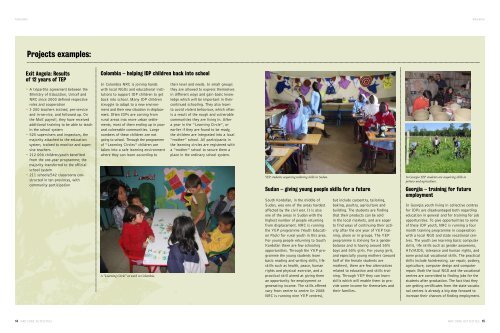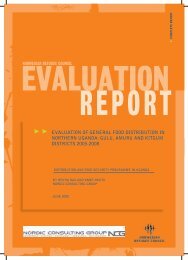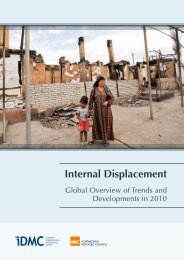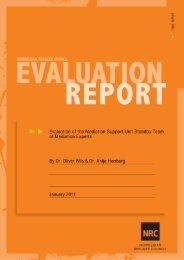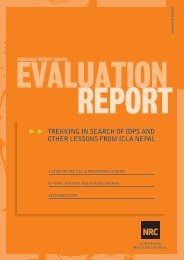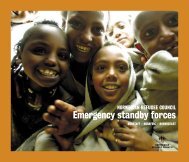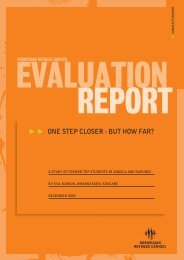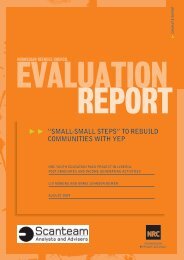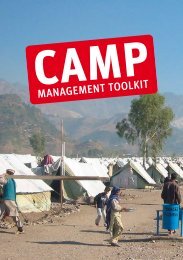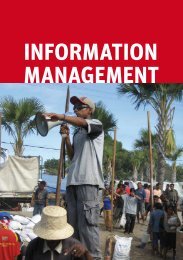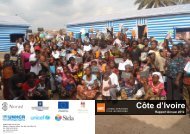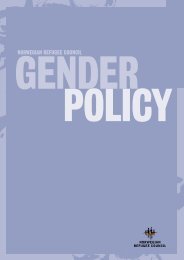NRC PROGRAMMES - Norwegian Refugee Council
NRC PROGRAMMES - Norwegian Refugee Council
NRC PROGRAMMES - Norwegian Refugee Council
You also want an ePaper? Increase the reach of your titles
YUMPU automatically turns print PDFs into web optimized ePapers that Google loves.
EducationEducationProjects examples:Exit Angola: Resultsof 12 years of TEP• A tripartite agreement between theMinistry of Education, Unicef and<strong>NRC</strong> since 2000 defined respectiveroles and cooperation• 3 200 teachers trained, pre-serviceand in-service, and followed up. Onthe MoE payroll, they have receivedadditional training to be able to teachin the school system• 525 supervisers and inspectors, themajority attached to the educationsystem, trained to monitor and superviseteachers• 212 000 children/youth benefitedfrom the one-year programme; themajority transferred to the officialschool system• 211 schools/542 classrooms constructedin ten provinces, withcommunity participationColombia – helping IDP children back into schoolIn Colombia <strong>NRC</strong> is joining handswith local NGOs and educational institutionsto support IDP children to getback into school. Many IDP childrenstruggle to adapt to a new environmentand their new situation in displacement.Often IDPs are coming fromrural areas into more urban settlements,most of them ending up in poorand vulnerable communities. Largenumbers of these children are notgoing to school. Through the programmeof “Learning Circles” children aretaken into a safe learning environmentwhere they can learn according toA “Learning Circle” at work in Colombia.their level and needs. In small groupsthey are allowed to express themselvesin different ways and gain basic knowledgewhich will be important in theircontinued schooling. They also learnto avoid violent behaviour, which oftenis a result of the rough and vulnerablecommunities they are living in. Aftera year in the “Learning Circle”, orearlier if they are found to be ready,the children are integrated into a local“mother” school. All participants inthe learning circles are registered witha “mother” school to secure them aplace in the ordinary school system.YEP students acquiring tailoring skills in Sudan.Sudan – giving young people skills for a futureSouth Kordofan, in the middle ofSudan, was one of the areas hardestaffected by the civil war. It is alsoone of the areas in Sudan with thehighest number of people returningfrom displacement. <strong>NRC</strong> is runningthe YEP programme (Youth EducationPack) for rural youth in this area.For young people returning to SouthKordofan there are few schoolingopportunities. Through the YEP programmethe young students learnbasic reading and writing skills, lifeskills such as health, peace, humanrights and physical exercise, and apractical skill aimed at giving theman opportunity for employment orgenerating income. The skills offeredvary from centre to centre (in 2008<strong>NRC</strong> is running nine YEP centres),but include carpentry, tailoring,baking, poultry, agriculture andbuilding. The students are findingthat their products can be soldin the local markets, and are eagerto find ways of continuing their activityafter the one year of YEP training,alone or in groups. The YEPprogramme is striving for a genderbalance and is having around 50%boys and 50% girls. For young girls,and especially young mothers (aroundhalf of the female students aremothers), there are few alternativesrelated to education and skills training.Through YEP they can learnskills which will enable them to providesome income for themselves andtheir families.In Georgia YEP students are acquiring skills inpottery and agriculture.Georgia – training for futureemploymentIn Georgia youth living in collective centresfor IDPs are disadvantaged both regardingeducation in general and for training for jobopportunities. To give opportunities to someof these IDP youth, <strong>NRC</strong> is running a fourmonth training programme in cooperationwith a local NGO and state vocational centres.The youth are learning basic computerskills, life skills such as gender awareness,HIV/AIDS, tolerance and human rights, andsome practical vocational skills. The practicalskills include hairdressing, car repair, pottery,agriculture, computer design and computerrepair. Both the local NGO and the vocationalcentres are committed to finding jobs for thestudents after graduation. The fact that theyare getting certificates from the state vocationalcentres is already a big step forward toincrease their chances of finding employment.14 <strong>NRC</strong> CORE ACTIVITIES <strong>NRC</strong> CORE ACTIVITIES 15


